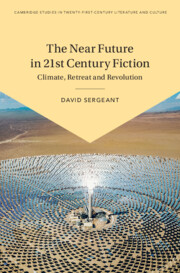Book contents
- The Near Future in Twenty-First-Century Fiction
- Cambridge Studies in Twenty-First-Century Literature and Culture
- The Near Future in Twenty-First-Century Fiction
- Copyright page
- Contents
- Acknowledgements
- Introduction
- Chapter 1 The Domestic Near Future 1
- Chapter 2 The Domestic Near Future 2
- Chapter 3 State of the Arts
- Chapter 4 Diagnostic Dead-Ends
- Chapter 5 The Art of History
- Chapter 6 Identity and Power
- Chapter 7 In Search of Revolution
- Chapter 8 The Genre of Revolution
- Notes
- Bibliography
- Index
Chapter 2 - The Domestic Near Future 2
Bodies
Published online by Cambridge University Press: 07 August 2023
- The Near Future in Twenty-First-Century Fiction
- Cambridge Studies in Twenty-First-Century Literature and Culture
- The Near Future in Twenty-First-Century Fiction
- Copyright page
- Contents
- Acknowledgements
- Introduction
- Chapter 1 The Domestic Near Future 1
- Chapter 2 The Domestic Near Future 2
- Chapter 3 State of the Arts
- Chapter 4 Diagnostic Dead-Ends
- Chapter 5 The Art of History
- Chapter 6 Identity and Power
- Chapter 7 In Search of Revolution
- Chapter 8 The Genre of Revolution
- Notes
- Bibliography
- Index
Summary
The figure of the child has frequently been seen as central to discourses about the future; this chapter argues that its importance is trumped by the sensorially rich individual body. In Gold Fame Citrus by Claire Vaye Watkins (2015), the child introduces a temporality of change and is associated with collectives that can only appear as a threat. In The Rapture (2009) by Liz Jensen, climate events intensify embodiment, while the desolation of apocalypse finds its true aetiology in the compound spectre of parenthood and the public realm. Her (2014, dir. Spike Jonze) is oblivious to climate change but shaped by a valorisation of the human body ensconced in domestic comfort, as it is threatened by the spectre of the mass. In all three fictions, the turn to the body is the denial of a fundamental equality with an Other both within and without the state. The chapter closes by showing how John Lanchester’s The Wall (2019) passes from a nationalist dystopia to the germ of a utopian collective in which the legacies of colonialism are finally overcome, to an isolation buoyed by material comfort, in a manner that updates Daniel Defoe’s Robinson Crusoe for the Anthropocene.
Keywords
- Type
- Chapter
- Information
- The Near Future in Twenty-First-Century FictionClimate, Retreat and Revolution, pp. 41 - 61Publisher: Cambridge University PressPrint publication year: 2022



